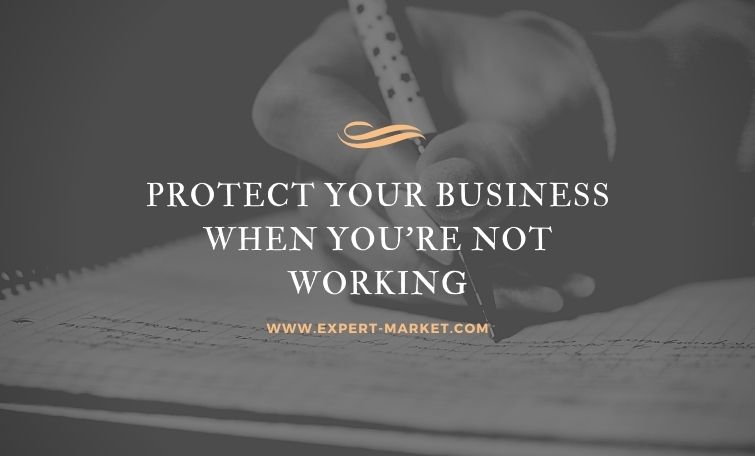Whether a business shutdown is short-term or long-term, there are some things you must do to prepare for the event. More specifically, there are some steps you should be taking to secure and protect your business assets in all their forms.
Of course, you should first announce the impending shutdown to customers, investors, and partners. It’s always best to refrain from communicating until after you know the finer details and can provide an accurate timeline. Many will be asking when your business will reopen or when your products and services will be available again.
Here are some additional ways to protect your business, online and off, when you’re not working, or when business must be halted.

1. Liquidate Expiring Assets
Depending on the industry you serve and what products or goods you provide, you may be dealing with items that are about to expire. These “current assets” would normally be converted into cash within a year of acquiring them.
They are things like food or other time-sensitive goods that would just fester during the lull in business. It’s better, instead, to sell off as much of your inventory as possible, to eliminate waste and cut down on lost or expired goods.
There are a few ways to approach this. You could have a major sale to liquidate the items, or you could strike a deal with partners, other businesses, or even rivals. It’s also possible to donate certain goods and then use tax deductions to recuperate the losses. Some goods may be eligible for returns or refunds, although it’s rare.
2. Collect Accounts Receivable
If you have done any contract work or are currently offering services to various clients, be sure to collect the money you’re owed. In most cases, you’ll have a deadline for the shutdown, which means you should be setting a deadline for invoices and payments, as well.
You don’t want to be chasing after clients in the middle of a shutdown or during your time off. It’s much easier to settle all of your accounts and debts before going away.
3. Pay Down or Mitigate Your Debts
Income will either be slowed or stopped, which means more room for failure when it comes to paying bills and debts. Before you step away, ensure that the more significant obligations are either paid in full or that there’s money set aside to pay them on time.
The world continues moving, even if you’re not, and your debtors are going to expect their dues. Make no mistake, they will come calling.
4. Clarify Your Lease
Unless you own the business property outright, which is certainly possible, you’re likely leasing a facility or location. If and when you are, it’s important that you not only understand your lease agreement but clarify terms with your landlord or the property management crew.
If you’re going to be leaving supplies, equipment, goods, and other items on-site, you’ll need to protect them accordingly and make sure they are truly safe at the leased location. Hiring on-site security is never a bad idea, but that won’t do you any good if the landlord enters the property and removes everything.
To that end, it’s important that all property debts are paid or that you have some capital to ensure the lease will be honored.
5. Plan Your Peripherals
As mentioned, on-site equipment, tools, supplies, and other items will need to be properly secured in your absence. This may require additional steps to ensure they are not seized, stolen, sold, or even so that they don’t fall into a state of disrepair.
If storing them within your business is safe and viable, by all means, do so. If you cannot guarantee the safety of your physical assets, it’s better to move them to a more secure location. You might move them to another business property or warehouse, you might find reliable storage — like a temporary storage center — or you may even consider bringing them home. You should also be checking in on the equipment regularly, or you can delegate the task to someone you trust.
Whatever the case, plan out what you’ll be doing to secure your peripheral gear so that it doesn’t go missing or worse. If the gear cannot be moved or you have no other choice, consider installing a security system. They often offer remote access capabilities, so you can check in while you’re away, and they will capture nefarious activities.
6. Manage Insurance Policies
For the most part, insurance policies exist to protect assets if and when there’s a major event, such as a natural disaster, accident, or burglary. You probably have insurance on your business and beyond, which is excellent, but you’ll want to make sure everything is in order before taking your leave.
Contact your insurance provider to verify or update your information, make necessary policy changes, or double down on coverage wherever applicable. The last thing anyone wants to find out in the wake of a major event is that their coverage lapsed and they are no longer protected.
Don’t be that person. Make sure your insurance plans are in proper order.
7. Adapt Your Offerings
Bear in mind that this strategy may not apply to every business or every medium. If a shutdown is imminent, and you have the opportunity, it’s a win-win to adapt your services or products so that you may still deliver online sales and experiences. Many businesses have done precisely this to help cope with things like the current pandemic, social distancing, and lockdowns.
Customers and income are two assets that you may or may not acknowledge. Even with a shutdown, or when you’re not working, it’s not smart to let those stagnate, especially customers who could turn to your competition in the meantime.
Evolve your processes and deliveries to coincide with the time off. Maybe you can start selling your products online and shipping them to customers? Maybe you could still provide a pickup location? Perhaps there are other services you can offer to secure your income.
It’s Not a Joke: Secure Your Business
Whether you’ll be gone for a couple of weeks, a few months, or over a year, it doesn’t matter. Take the time to secure your business assets before a shutdown. Ensure all of your current assets are suitably cared for or sold and that your non-current assets are also adequately protected.
You might consider moving equipment, gear, or supplies to a more secure location or installing a live security system when that’s not possible. Moreover, you should take care of all debts, collect all owed invoices, and double-check your insurance coverage.
Finally, secure your business location by paying your lease and adapt your business to survive during the lull. The latter may require you to upgrade processes or offerings before leaving, such as opening online sales and fulfillment.

Eleanor Hecks is editor-in-chief at Designerly Magazine. Eleanor was the creative director and occasional blog writer at a prominent digital marketing agency before becoming her own boss in 2018. She lives in Philadelphia with her husband and dog, Bear.



























